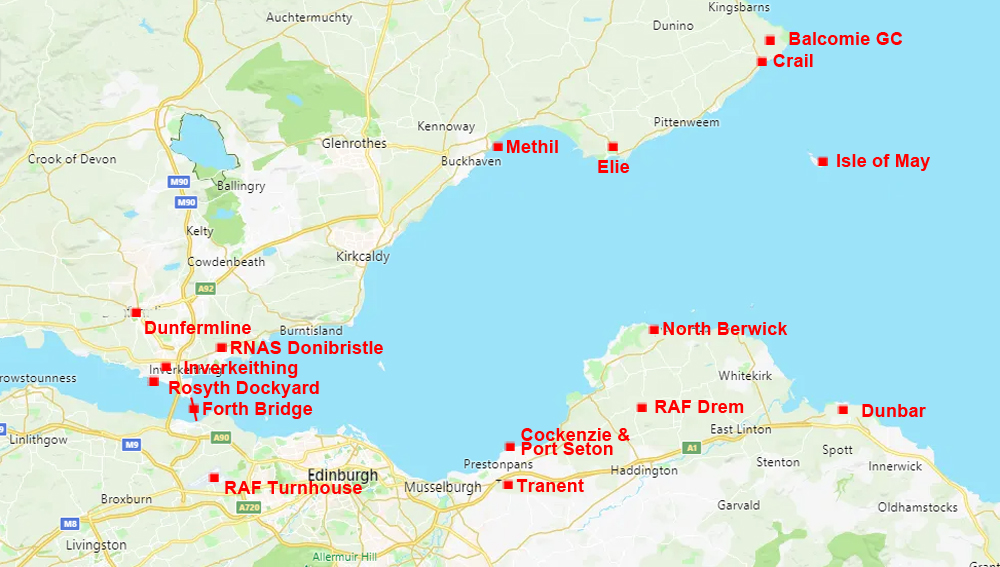First Air Raid of WWII – 30
14.55 Pohle is forced to ditch his plane in the Forth
| < 29 Pohle intercepted | Δ Index | 31 Pohle rescued > |
At the controls of his Ju88, Helmut Pohle used all his experience in an attempt to shake off the Spitfires of Pinkerton and McKellar, or at least minimise the opportunity for them to open fire.
Eventually, and in order to maintain a course home, he was forced to leave what little cloud cover there was and make a dash eastwards. He was now flying in clear skies over the sea with the two fighters to the rear and above.
The Spitfire of Pinkerton appeared to be to his starboard side while that of McKellar was on his port. Whichever way Pohle turned he couldn’t avoid flying into the firing line of one or other of the faster more manoeuvrable RAF fighters.
With the leading Spitfire now only 50 yards behind, Pohle pulled back hard on his control column in order to shake off the fighters but in doing so he presented Pinkerton with a view of the upper surfaces and he immediately opened fire, sending a burst from his eight Brownings smashing into the German bomber, shattering the cockpit and claiming the life of Pohle’s co-pilot and gunner and wounding the radio operator.
A burst from McKellar’s Spitfire damaged a wingtip of the Junkers. Bullets from Pinkerton and McKellar’s aircraft hit the starboard engine while McKellar smashed the port engine with the last of his ‘pellets’.
With fuel streaming from his ruptured wing-mounted fuel tanks, Pohle dived towards a merchant ship and levelled out at 500 feet over the Forth. He later recalled:
I was surprised by a Spitfire which I could not get away from. Also, we could not defend ourselves with the rear top gun as it had gone with the canopy. After another attack during which two of my crew were killed, one of the engines failed and began to smoke. Flying with one engine I managed another 20km, when – some distance off the Scottish coast – flying in an easterly direction, the next Spitfire attack destroyed the second engine too.
Without both engines I must go down [to sea level]. I saw a trawler and aimed to [bale out] near to the ship with my parachute, but the fourth man of my crew, the gunner of the rear below gun, was badly wounded.
[I hesitated] and was just able to clear the trawler before ditching the Junkers, although the sea was running at strength. The crew of the trawler (I hoped it would be Norwegian, then a neutral country) rescued me as well as my fourth crew member. However, I collapsed on the deck with concussion and face injuries. My crew man died from his injuries the next day.
A few days later I regained consciousness. A white bed and a nurse. I thought I was in Norway. However, I was in the Royal Navy Hospital at Port Edwards [Edgar], near Edinburgh. At the head of the bed stood an RAF intelligence officer.
About ten days later I was transferred to a military hospital in Edinburgh Castle. After that and shortly before Christmas I was taken to the Tower of London and finally off to No.1 PoW Camp, Grizedale Hall / Westmorland.
Later I heard one of my two bombs each 500kg, hit the Southampton.
Pohle had been attempting to reach the Hornum, a rescue trawler the German navy had positioned off the east coast of Scotland. He made one last attempt to gain altitude before dropping ‘like a stone’ into the icy waters of the North Sea.

The members of Balcomie Golf Club on Fife Ness had an excellent view of the death of the bomber.
The force of the impact with the sea smashed the perspex nose of the Junkers. With their ammunition exhausted Pinkerton and McKellar circled the aircraft before Pinkerton flew towards the merchant vessel and flashed an SOS with his downward inverted signal lamp and waggled his wings, before returning to the Junkers. By now petrol was seeping from the holed fuel tanks, creating coloured streaks on the surface of the sea.
With the merchant ship having set course for the downed aircraft, Pinkerton and McKellar returned to Drem.
| < 29 Pohle intercepted | Δ Index | 31 Pohle rescued > |